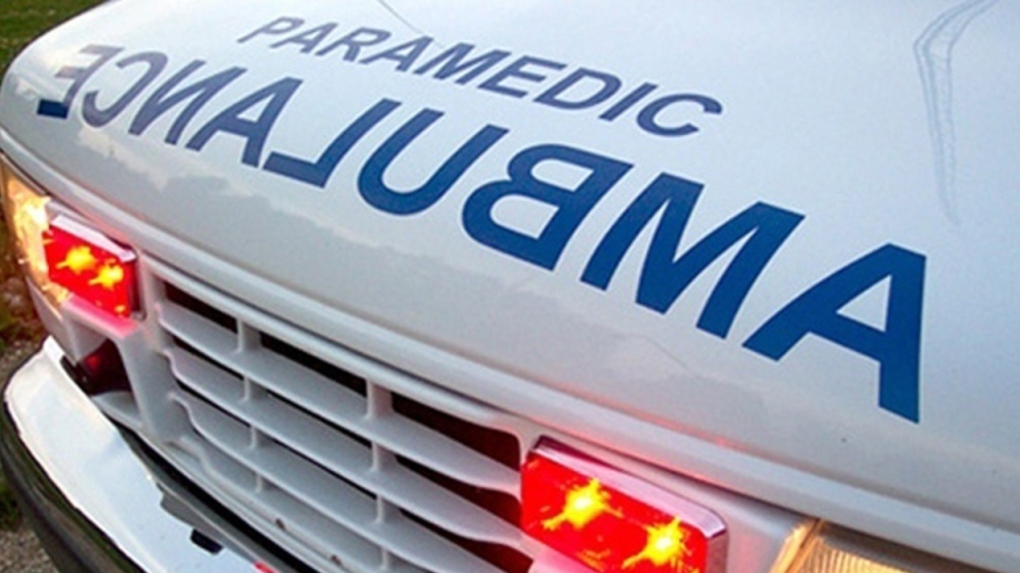Public health warns 'Zombie drug' is circulating in Guelph
 An ambulance is shown in a file photo. (CP24)
An ambulance is shown in a file photo. (CP24)
Xylazine – an animal tranquilizer detected in an increasing number of opioid-related deaths in Ontario – has been identified in the Wellington-Dufferin-Guelph region, the Wellington Guelph Drug Strategy warns.
In an alert posted on Friday, the drug strategy says xylazine, also known as “tranq” or “Zombie drug,” does not respond to naloxone, increasing the risk of fatal overdose.
Rita Isley, Wellington-Dufferin-Guelph Public Health community health director, said while many drug can cause lesions or abscesses when injected, the affects of xylazine are often more severe.
“We are seeing that those lesions are much more significant, can lead to in depth tissue damage and could also lead to amputation and or death if it’s not treated properly,” Isley said. “And we’re seeing it more frequently in people who have been using drugs with xylazine in it, versus people who are using other injectable type drugs.”
Public health recommends carrying naloxone and never using alone to reduce the risk of overdose.
The Consumption and Treatment Service Site (CTS) at Guelph’s Community health Centre is open Monday through Sunday 9 a.m. to 5 p.m.
CTVNews.ca Top Stories

B.C. tenants evicted for landlord's use after refusing large rent increase to take over neighbouring suite
Ashley Dickey and her mother rented part of the same Coquitlam duplex in three different decades under three different landlords.
Mountain guide dies after falling into a crevasse in Banff National Park
A man who fell into a crevasse while leading a backcountry ski group deep in the Canadian Rockies has died.
Expert warns of food consumption habits amid rising prices
A new survey by Dalhousie University's Agri-Food Analytics Lab asked Canadians about their food consumption habits amid rising prices.
MPP Sarah Jama asked to leave Ontario legislature for wearing keffiyeh
MPP Sarah Jama was asked to leave the Legislative Assembly of Ontario by House Speaker Ted Arnott on Thursday for wearing a keffiyeh, a garment which has been banned at Queen’s Park.
Charlie Woods, son of Tiger, shoots 81 in U.S. Open qualifier
Charlie Woods failed to advance in a U.S. Open local qualifying event Thursday, shooting a 9-over 81 at Legacy Golf & Tennis Club.
Ex-tabloid publisher testifies he scooped up possibly damaging tales to shield his old friend Trump
As Donald Trump was running for president in 2016, his old friend at the National Enquirer was scooping up potentially damaging stories about the candidate and paying out tens of thousands of dollars to keep them from the public eye.
Here's why provinces aren't following Saskatchewan's lead on the carbon tax home heating fight
After Prime Minister Justin Trudeau said the federal government would still send Canada Carbon Rebate cheques to Saskatchewan residents, despite Saskatchewan Premier Scott Moe's decision to stop collecting the carbon tax on natural gas or home heating, questions were raised about whether other provinces would follow suit. CTV News reached out across the country and here's what we found out.
Montreal actress calls Weinstein ruling 'discouraging' but not surprising
A Montreal actress, who has previously detailed incidents she had with disgraced Hollywood producer Harvey Weinstein, says a New York Court of Appeals decision overturning his 2020 rape conviction is 'discouraging' but not surprising.
Caleb Williams, Jayden Daniels and Drake Maye make it four NFL drafts with quarterbacks going 1-3
Caleb Williams is heading to the Windy City, aiming to become the franchise quarterback Chicago has sought for decades.

































